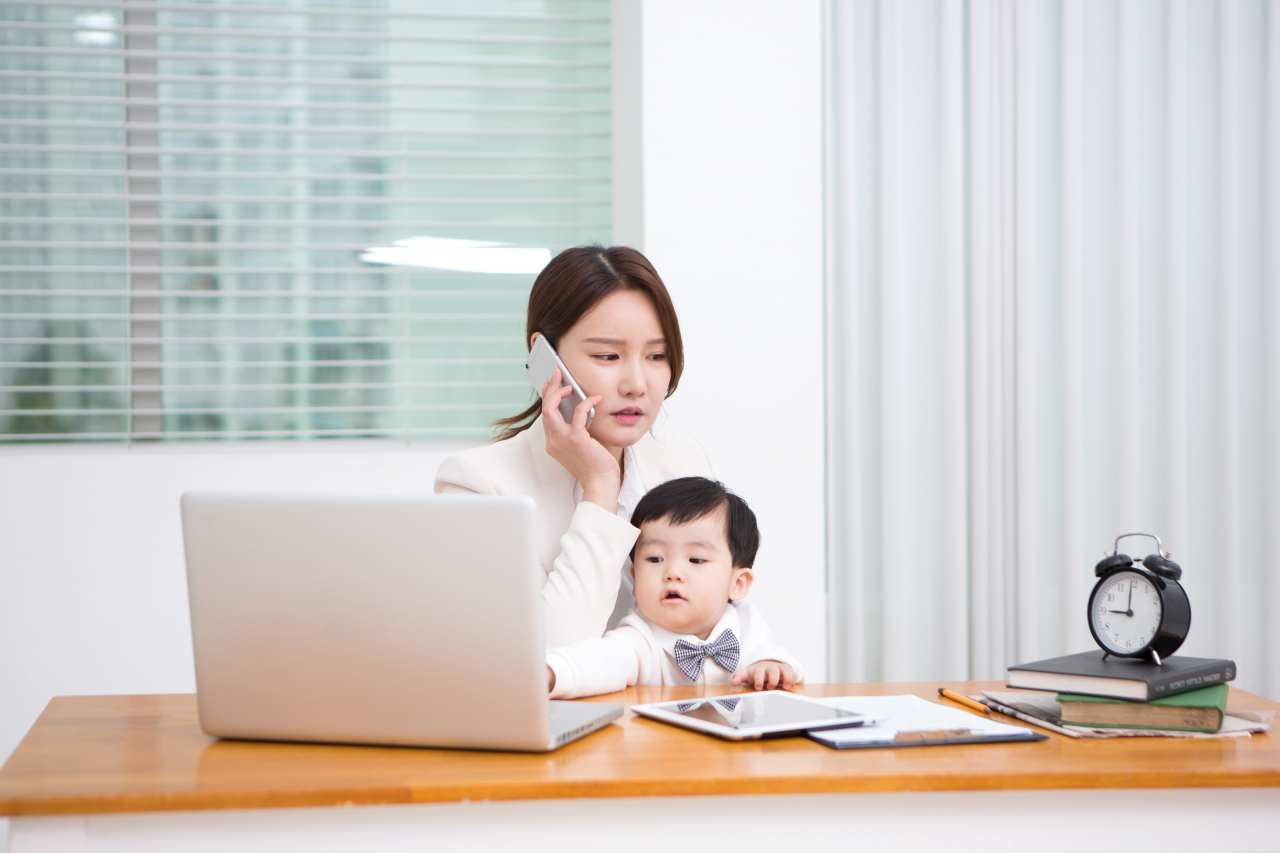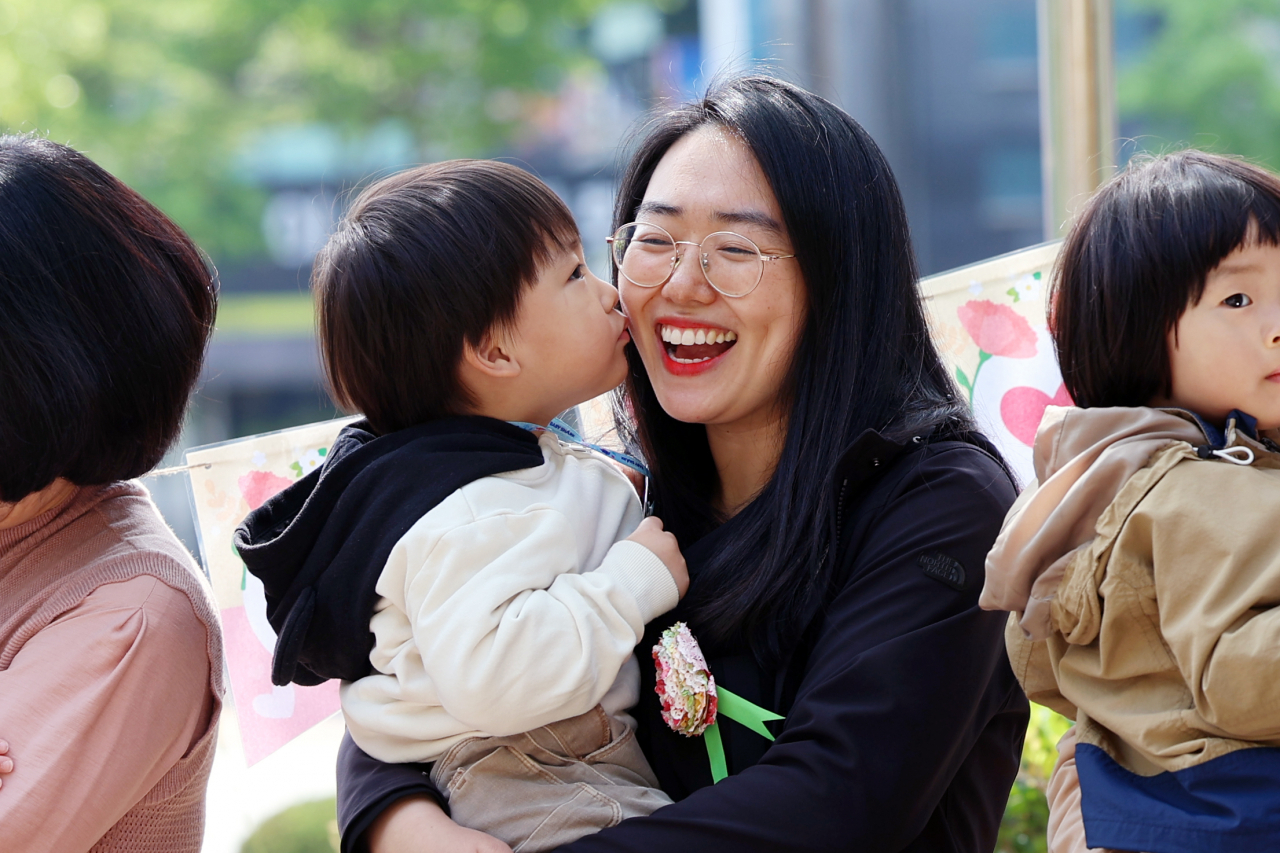Last month, the Labor Ministry launched an investigation into claims that a female software developer at Naver, the nation’s top internet firm, committed suicide after being bullied at work because she was a working mom.
The bereaved family of the unnamed developer, who died last September, claimed that the victim was subject to discrimination since returning from maternity leave. The family requested that the ministry investigate the local tech firm for alleged violations of the Labor Standard Act.
Although the investigation is ongoing and it is unclear what the outcome will be, many working mothers say they, too, feel disadvantaged at work because their child care responsibilities are often perceived as a hindrance to their work.
Due to such perceptions, many women are refraining from having babies or getting married at all, some surveys show.
‘It’s not like I could ask my husband to quit work’
Yun Bo-ra, a 37-year-old mother of two, has been freelancing since she quit her job at a bank five years ago. When she got pregnant with her first child, Yun said she felt like she “had to quit.”
“My contract was expiring and I felt like I couldn’t find another job immediately (after having my child),” she said, explaining her decision to start freelancing. “It’s not like I could get my husband to quit his job.”
When asked why she thought asking her husband to quit was out of the question, Yun said the social perception of gender roles played a part.
She and her husband – who is four years her junior -- are not part of the generation that assumes women should be primary caretakers for children. However, even younger generations who grow up believing in gender equality are not immune to social expectations pervasive across Korean society, as the couple demonstrates.
Yun is what government officials categorize as a “career-interrupted woman,” which refers to a woman whose professional career has been disrupted by marriage, pregnancy, child care or other family-related matter. According to the 2022 Gender Statistics in Korea, 46.1 percent of the unemployed married women in the country fall into this category.

Stats show that 65.6 percent of them had received a college education. In fact, the rate of female high school graduates receiving tertiary education has been higher than that for males since 2009 -- the most recent figure being 76.6 percent for women and 70.3 percent for men in 2022.
In short, many college-educated females exit the workforce, voluntarily or involuntarily, by the time they get married, get pregnant or after giving birth.
Parental leave a limited option
The Presidential Committee on Aging Society and Population Policy recently rolled out a number of new measures to encourage childbirth, including a planned expansion of the current parental leave from up to 24 months to up to 36.
But in reality, there are many parents who are unable to use any leave at all.
Gapjil 119, a local civic group comprising of 150 labor law experts, conducted a survey in March on 1,000 office workers. Some 45 percent of the respondents said they are “unable to freely use” their right for child care leave. Some 36 percent said the same for the maternity leave.
Taking time off is a tougher option, particularly for those working in small- and medium-sized companies. According to Statistics Korea’s December report, 62.4 percent of working moms who took parental leave worked for companies that had 300 or more employees.
Even if one can take leave, the employee fears facing discrimination upon returning to work. This often takes the form of being reassigned to less desirable posts or to one unrelated to their previous work.
The Equal Employment Opportunity and Work-Family Balance Assistance Act stipulates that it's illegal for an employer to discriminate against a worker based on gender, marriage, status within family, pregnancy or childbirth without justifiable reasons. However, the law does not specify what constitutes “discrimination.”
Rep. Seo Dong-yong of the main opposition Democratic Party in February proposed a bill that seeks to define such discrimination in detail. This would include dismissal, suspension, demotion, exclusion from due promotion and personnel decisions against the employee’s will such as reassignment of duties or overall exclusion from duties.

No kids, no problem?
Difficulty in balancing work and child care is being cited as among the biggest reasons why young women in the country are reluctant to get married at all.
Local pollster PMI Research and Consulting recently conducted a survey on 2,400 single men and women between ages 19-59, in which 68.6 percent of the female respondents said they have no intention to get married. This figure is substantially higher than the 53.9 percent of male respondents who said they did not plan to tie the knot.
South Korea has seen a steady decline in the number of newlyweds, from 329,087 couples in 2011 to 192,507 in 2021, according to Statistics Korea.
Moreover, a significant number of married couples are opting to have no children.
The PMI survey mentioned above also showed that 53.2 percent of married men and women say they do not plan to have kids. About 67.1 percent of married women who reported no plans to have kids said the reason was “due to fear of their careers being disrupted (by childbirth).”
As such, South Korea’s total fertility rate -- the average number of children a woman is expected to have over one’s lifetime -- hit an all-time low of 0.78 in 2022. The figure was the lowest among all member countries of the Organization for Economic Cooperation and Development.
With the South Korean government pledging an all-out effort to boost childbirths, many young women say that the country's workplace culture must change first.
Lee, an office worker in her 30s, said her supervisor jokingly mentioned that she beat out other female applicants for the job, mainly because one of the applicants had two children.
“That made me wonder if I would still have a place (at work) to come back to after maternity leave, since giving birth would put me in the exact same spot (as the other applicant),” she said.
Days before her death by suicide, the deceased Naver developer said, “I think the company wants me out. My only crime is that I raised (my child) the best I could.”
“I guess being a working mom is a crime,” she was quoted as saying by her bereaved family.




![[From the Scene] Monks, Buddhists hail return of remains of Buddhas](http://res.heraldm.com/phpwas/restmb_idxmake.php?idx=645&simg=/content/image/2024/04/19/20240419050617_0.jpg&u=20240419175937)
